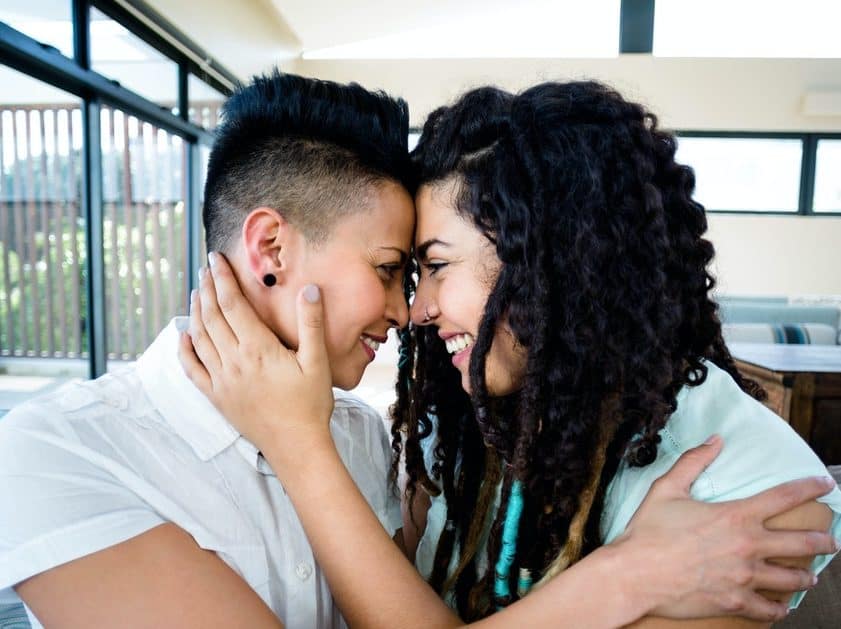- Have you ever started to fantasise about others while dating someone else?
- Ever flirted with people in order to ‘cushion’ the blow if your current relationship doesn’t work out?
- If you’ve answered yes to the above, there’s a name for your behaviour: ‘cushioning’

What is cushioning?
You’ve heard of benching, ghosting, and catfishing – but what’s cushioning?
Cushioning is a new dating term to describe a situation where you might flirt with other people to cushion the blow if your current relationship doesn’t work out.
According to Urban Dictionary, cushioning is when someone keeps open potential romantic “options” while they’re in a committed relationship. Journalist Róisín Lanigan writing for babe.net explains that it’s a trend for “the cautious and the cynics among us.”

Why is cushioning bad?
Cushioning when you’re already in a strictly monogamous relationship isn’t exactly the best way to go about things. Even though you might justify your actions by telling yourself that it doesn’t count as ‘cheating’ because you’ve not done anything physical, it’s clear that you aren’t demonstrating great commitment to your partner by flirting with and fantasising about other people.
Speaking to Refinery29, dating coach Tennesha Wood condemns cushioning as “emotional cheating.” “There’s a line there,” she explains. “You’re not necessarily physically cheating, but you are engaging in a behaviour with a potential romantic interest that you’re probably not telling your partner about.”

Licensed mental health counsellor Justine Carino agrees and encourages ‘cushioners’ to ask themselves why they’re even bothering to remain in a relationship where they’re not completely besotted with their current partner. “You are already predicting the demise of your relationship, which should be a red flag for you,” she explains. “If you are in a relationship that you are predicting will fail, you should question yourself […] why are you in it in the first place?”
Is cushioning ever OK?
There are some (albeit limited) instances where cushioning is more acceptable. Dating expert Maria Sosa says that “at the beginning of a relationship it’s very common and it makes a lot of sense.” Speaking to Cosmpolitan, dating coach and author Jenna Birch goes as far as saying cushioning can be a good thing. “A lot of my clients need to be seeing multiple people at one time, to keep from focusing all their energy on one person,” she explains. “Even if they are really, really interested in that one person, they wait until commitment is defined.”

It can be hard not to get your hopes up and get overly invested in someone after just one date, and for some, cushioning is a great way of keeping options open and not getting too attached too quickly. Still, Sosa clarifies and adds: “after you have defined the relationship and you’ve said, ‘OK, we’re committed to each other,’ then it gets a little bit into that betrayal area.”
This is something that we can all surely agree on: pursuing romantic connections with others while in a monogamous relationship is an unambiguous betrayal.
Why do people cushion?
So why do people do this? Speaking to Bustle, psychologist and relationship expert Dr. Jennifer Rhodes explains that this is a sign of emotional immaturity. “This would be what emotionally insecure people do, and it’s not really a new phenomenon,” she explains.

“Quite frankly, it makes me sad that people have such trouble with emotional intimacy and talking about feeling scared with the person you are dating. You can’t really fall in love unless you are ready to get hurt. Cushioning is for people who are not ready for real love.” Rhodes also adds that cushioning is “self-involved and lacks kindness and generosity.”
Women’s mental health expert Heidi McBain explains further to Cosmo: “[Cushioning] can mean that you’re not willing to fully commit to the person you’re in a relationship with, which may mean fear of commitment is actually driving your cushioning need,” she shares.
It seems cushioning is also partly symptomatic of the modern world – thanks to the seemingly limitless nature of options on dating apps, it’s no surprise that a lot of people feel that the grass is always greener and shirk properly committing to one partner.

How can you stop feeling the need to cushion?
If you’re the one that’s keeping a handful of potential partners on the back burner while still in a (supposedly) monogamous relationship, it’s time to do some soul-searching.
Wood tells Refinery29: “if your needs aren’t being met or this isn’t the type of relationship you want, that’s when it’s time to have a conversation with your partner. At all stages of your relationship, you need to be communicating with your partner.”

Wood continues: “a lot of the time, I don’t think this is about what your partner is doing. I think it’s a real insecurity in either yourself or things that have happened in your past and you’re projecting it onto this relationship and not giving it its full shot because you’re preparing for it to end.”
Sosa also adds that we might be demanding too much and suggests that we be realistic when it comes to the expectations we have for our partners. “We’ve grown up and been taught that we meet this one person who we end up being with who’s supposed to meet all of our needs,” she says. “This one person is our best friend, the person we’re intimate with, who we have deep conversations with, and it puts a lot of pressure on relationships for that one person to be our everything.”

Both Wood and Sosa are clear – if you’re the one doing the cushioning, you’re also the one who’s going to need to sort out the situation. You need to be honest with your partner – and also honest with yourself. Chances are, there’s nothing ‘wrong’ with your partner that’s driving you into cushioning – as Wood says, it’s far more likely the issue lies within you.

